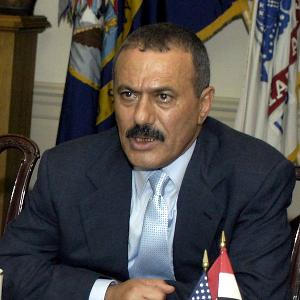[Dawn] Yemen's political rivals have agreed to sign a Gulf-brokered plan Wednesday to end the country's bloody political crisis, the president's aid told Al-Arabiya television, but the opposition expressed doubts whether it would happen.
When asked if the agreement would be signed Wednesday, President President-for-Life Ali Abdullah Saleh 's 's
... Saleh initially took power as a strongman of North Yemen in 1977, when disco was in flower...
aide Ahmed al-Sufi said: "Yes, it will be today." There has been 'positive' and 'important progress.' But parliamentary opposition Mohammed Qahtan said a break in the impasse between the two sides had been reached on Tuesday night, and then Saleh's sign backed away.
"If the initiative was unchanged" from its initial version, "we will sign," Qahtan said.
"We came to an agreement late Tuesday but this morning they changed their minds," Qahtan told AFP, adding that Saleh and his partisans 'refuse' to sign it this way.
"The disagreement is on who will sign from the opposition," said Qahtan.
However,
The contradictory However ...
"there's an agreement on the time frame." Yemen has been gripped by deadly protests since late January calling for the ouster of Saleh, who has been in power since 1978.
Besides an al Qaeda resurgence, the impoverished country is battling a secessionist movement in the south and a Shiite rebellion in the north.
Saleh has been insisting that, under the constitution, he should serve out his current term of office, which expires in 2013. Last Thursday, however, Washington called on him to sign the deal "now." For weeks, the agreement has been held up by Saleh refusing to sign in his capacity as president. He has insisted on endorsing the deal only as leader of the ruling General People's Congress, contrary to the demands of the opposition.
Talks are ongoing, said Qahtan, adding that the opposition will meet Gulf Cooperation Council (GCC) Secretary General Abdullatif al Zayani later on Wednesday.
On Tuesday, GPC front man Tareq al-Shami told AFP: "We have discussed with .... al Zayani the mechanism to implement a plan to end the crisis."
"This plan needs a time frame to implement it," said Shami.
On Friday, Qahtan declared the GCC initiative was 'dead' following the pullout of Qatar, whose prime minister had angered Sanaa by saying Saleh should go.
But he returned to Sanaa on Saturday in an attempt to convince both sides to sign the initiative.
The six GCC states have proposed an exit plan that would see embattled Saleh out of office within 30 days.
Under it, a government of national unity would be formed, Saleh would transfer power to his vice president and there would be an end to protests. In exchange, Saleh and his top aides would be granted immunity from prosecution.
At least 180 people have been killed in festivities during protests against Saleh's regime that erupted in late January, according to a toll compiled from reports by activists and medics.
Or maybe not...
Yemen's president has for a second time backed out of a Gulf-sponsored deal to transfer power.
The long awaited agreement brokered by the Gulf Co-operation Council (GCC) would have seen President-for-Life Ali Abdullah Saleh stepping down within a month.
Yemen's opposition had earlier said the deal would be signed on Wednesday.
But the head of the GCC, a group of Gulf states, left Sanaa, the capital, without securing a signed agreement.
The departure of Abdullatif al-Zayani suggested that differences remained despite the government and opposition earlier agreeing on the deal in principle.
Zayani had been in Sanaa since Saturday to try to persuade the sides to sign the deal, with help from US and European diplomats.
"Saleh wants to show the international community that he is not an oppressor and a dictator, that he is willing to leave power peacefully and democratically, where in reality that is not the case," Hakim al-Masmari, editor-in-chief of the Yemen Post, told Al Jizz.
Masmari said Saleh's backtracking on his initial agreement "is only putting him in a bad image and showing the world that his words are not credible and that he has lied not only to the opposition but also to the GCC officials".
Meanwhile,
...back at the Council of Boskone, Helmuth had turned a paler shade of blue. Star-A-Star had struck again...
the White House, urged Saleh to sign and implement a transition of power deal so that the country could "move forward immediately" with political reform.
John Brennan, an adviser to Barack B.O. Obama, the US president, called Saleh earlier in the day, the White House said in a statement.
"Brennan noted that this transfer of power represents the best path forward for Yemen to become a more secure, unified, and prosperous nation and for the Yemeni people to realize their aspirations for peace and political reform," the statement said.
Brennan also reiterated that all parties in Yemen should "refrain from violence and proceed with the transition in a peaceful and orderly manner".
Earlier, Al Arabiya television had quoted an adviser to Saleh as confirming the signing would take place on Wednesday.
The opposition, whose coalition includes Islamists and leftists, said that among the minor modifications in the deal were changes in who would sign and in what capacity for the opposition and for the government.
"The president will sign for the government in his capacity as president of the republic and as head of the ruling party," Yahya Abu Usbua, an opposition official, told the Rooters news agency earlier.
Modifications proposed by the ruling party, passed on to the opposition by diplomats, would let the ruling party appoint a unity government for the transition period until elections and would also change which opposition representative would sign the deal, the opposition leader said.
But some protest groups had said they would not accept the GCC plan. |
 [Magharebia] The "Friends of Syria" group will meet in Morocco on Wednesday, AFP reported on Monday (December 10th). Arab and Western states will consider two key issues concerning the 21-month Syria conflict: the political transition in the event of
[Magharebia] The "Friends of Syria" group will meet in Morocco on Wednesday, AFP reported on Monday (December 10th). Arab and Western states will consider two key issues concerning the 21-month Syria conflict: the political transition in the event of  Hereditary President-for-Life Bashir
Hereditary President-for-Life Bashir 
 ,
, The Yemeni president has refused to sign a Gulf Arab-led agreement to give up power in exchange for legal immunity, sources say.
The Yemeni president has refused to sign a Gulf Arab-led agreement to give up power in exchange for legal immunity, sources say. [Al Jazeera] Bahrain has ordered the expulsion of a top Iranian diplomat over his alleged links to a Kuwaiti spy ring, ratcheting up already simmering tension between the Gulf neighbours.
[Al Jazeera] Bahrain has ordered the expulsion of a top Iranian diplomat over his alleged links to a Kuwaiti spy ring, ratcheting up already simmering tension between the Gulf neighbours. Earlier this month, Iranian state television said.
Earlier this month, Iranian state television said. Ali Abdullah Saleh
Ali Abdullah Saleh cycle of violence
cycle of violence